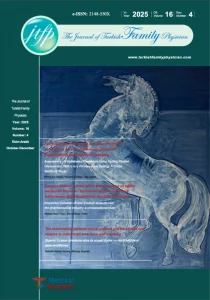Perception of cancer disease in adults without a diagnosis over eighteen: A qualitative research
Introduction and aim: Nowdays, the survival and treatment rates in cancer have increased while the incidence of cancer is gradually increasing. Cancer perceptions and knowledge situations that determine thr behaviors and attitudes of individuals in the fight against cancer are important. In this research, it is aimed to qualitatively evaluate the cancer perceptions of individuals.
Materials and Method: Individuals over 18 year of age with different sociodemographic characteristics were included in this research planned in the qualitative structure. The voice recordings obtained in the semi-structured in-depth interviews were analyzed one by one, the codes were determined by mutual resding, and the thematic analysis was performed. The main questions asked during the interviews are “How do you think cancer is a disease, how cancer affects people’s lives, how would you feel if you are diagnosed with cancer?” A questionnaire from questionning the sociodemographic data and the attitudes, perceptions and information about cancer was applied to respondents before the interview. Data were analyzed with the SPSS 20.0 program.
Results: A total of 43 interviews were conducted by five researchers. The average age of the respondents was 39,9±16,1. 72,1% of the respondents were female, and 27,9% of them were male. Environmental factors (95,3%) are thought to cause cancer. All of the respondents think that cancer also affects the lives of others. A total of 11 codes and four themes were specified. Theme I. Emotional dimension of the disease “Why heve I been contracted? Why me other than someone else? What have I done… A sense of guilt devolops.”; Theme II. Thoughts and beliefs “Its is a disease that reminds people of the death that is already close.”; Theme III. The effect of cancer on humans “… They give you poison to cure and this poison destroys you.”; Theme IV. Attitudes and behavoirs towards cancer and cancer patients.”… You cannot do anything coming from Allah,… Not only you but also we will all together overcame it.” It was determined that there was a general perception that cancer is a process of struggle and changes the individual and his/her relatives, and the process is exhausting and killing. The level of knowledge and awarnesse of those who were the patiant’s relatives was found to be higer.
Conclusion: The researche indicates that perception of cancer has a very complex structure that includes emotionel and social dimensions, physically, mentally and spiritually affects the patients and their relatives and is shapes by environmental influences.
References
- World Health Organization. Cancer. 2019 http://www.who.int/topics/cancer/en/adresinden 30.07.2019 tarihinde erişilmiştir.
- VIII. Ulusal Meme Hastalıkları Kongresi Özet Kitapçığı,21-24 Eylül, İstanbul. 2005: 363.
- Kızılcı S. Kemoterapi alan hastalar ve yakınlarının yaşam kalite-sinin etkileyen faktörler. Cumhuriyet Üniversitesi Hemşirelik Yüksekokulu Dergisi 1999; 3:18-26.
- News releases. Who. int. 2019 https://www.who.int/news-room/releases adresinden 13.07.2019 tarihinde erişilmiştir.
- Petrie JK, Jago AL, Devhich DA. The role of illness perceptions in patients with medical conditions. Current Opinion in Psychiatry 2007; 20(2):163-7.
- Karabulutlu E, Karaman S. Kanser Hastalarında Hastalık Algısının Değerlendirilmesi. HSP 2015; 2(3):271-84.
- Patterson P, Moylan E, Bannon S, Salih F. Needs analysis of cancer education program in South Western Sydney. Cancer Nursing 2000; 23(3):186-92.
- Özkan S. Hastalıklara psikolojik tepkiler. Ulusal Konsültasyon Liyezon Psikiyatrisi 1998-1999 Kongre Kitabı, İstanbul. 2001: 27-30.
- Özkan MB. Psikoonkoloji. Ulusal Konsültasyon Liyezon Psikiyatrisi Kongre Kitabı. 1996: 21-6.
- Mor V, Allen S, Malin M. The psychosocial impact of cancer an older versus younger patients and their families. Cancer 1994; 74 (7 Suppl): 2118-27.
- Fallowfield L. Helping the relatives of patients with cancer. Eur J Cancer 1995; 31A: 1731-2.
- Grbich C, Parker D, Maddocks I. The emotions and coping strategies of caregivers of family members with a terminal cancer. J Palliat Care 2001; 17: 30-6.
- Çivi S, Kutlu R, Çelik HH. Kanserli hasta yakınlarında depresyon ve yaşam kalitesini etkileyen faktörler. Gülhane Tıp Derg 2011; 53: 248-53.
- Servaes P, Verhagen C, Bleijenberg G. Fatigue in cancer patients and after treatment: prevalence, correlates and interventions. Eur J Cancer 2002; 38:27-43.
- Corina W. New insights into public perceptions of cancer. Ecancermedicalscience 2013;7:349.
- Tokgöz G, Yaluğ İ, Özdemir S, Yazıcı A, Uygun K, Aker T. Kanser hastalarında majör depresyon yaygınlığı ve ilişkili etkenler. Anatolian Journal of Psychiatry 2008; 9:59-66.
- Onitilo AA, Nietert PJ, Egede LE. Effect of depression on all cause mortality in adults with cancer and differential effects by cancer site. Gen Hosp Psychiatry 2006; 28:396-402.
- Arıkan K. Kanser hastalarında psikolojik destek. Klinik Gelişim 2004; 17:77-86.
- Spiegel D, Giese-Davis J. Depression and cancer: mechanisms and disease progression. Biol Psychiatry 2003; 54:269-82.
- Fielding JE. Smoking: Health effects and control. N Engl J Med 1985; 313:491-8.
- Kushi LH, Byers T, Doyle C, Bandera EV, McCullough M, McTiernan A, et al. American Cancer Society 2006 Nutrition and Physical Activity Guidelines Advisory Committee. American Cancer Society guidelines on nutrition and physical activity for cancer prevention: Reducing the risk of cancer with healthy food choices and physical activity. CA Cancer J Clin 2006; 56: 254-81.
- Anand P, Kunnumakara AB, Sundaram C, Harikumar KB, Tharakan ST, Lai OS, et al. Cancer is a preventable disease that requires major lifestyle changes. Pharmaceutical Res 2008; 25: 2097-116.
- Boffetta P, Nyberg F. Contribution of environmental factors to cancer risk. Br Med Bull 2003; 68: 71-94.
- Dansuk R, Ağargü̧n M, Kars B, Ağargü̧n HP, Turan C, Ünal O. Jinekolojik kanserli hastaların psikososyal özelliklerinin değerlendirilmesi. Türkiye Klinikleri J Gynecol Obst 2002; 12:142-7.
- The PACE Cancer Perception 2019. http://pacenetwork.com/pace_index.php adresinden 30.07.2019 tarihinde erişilmiştir.



